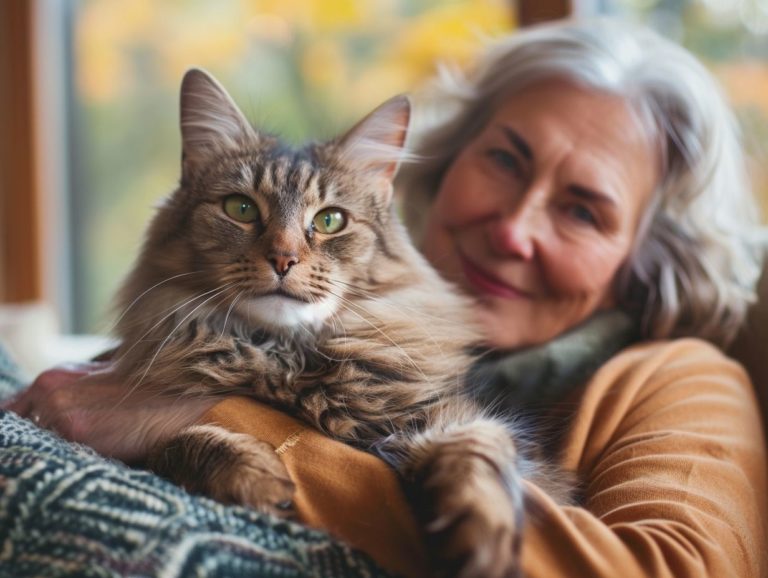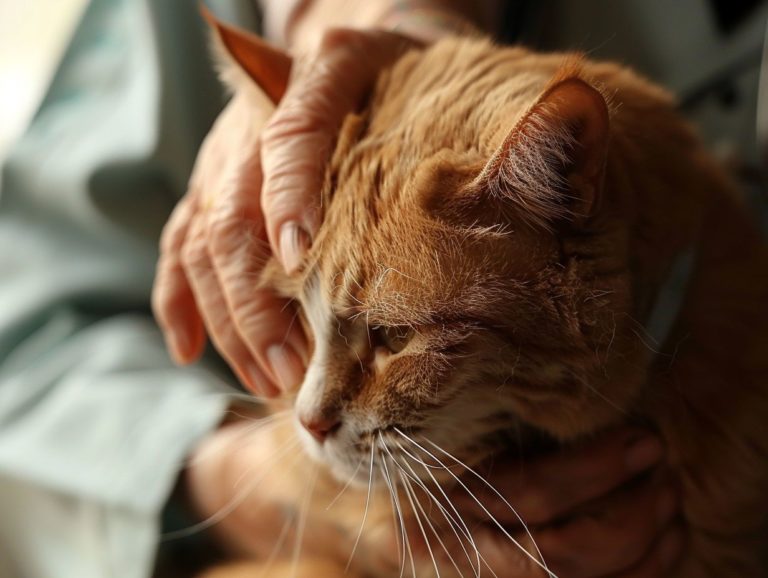Senior Cat Insurance What Vets Wish You Knew
This article discusses the importance of insurance for senior cats, the common health issues they may experience, the significance of insurance as advised by veterinarians, and tips on selecting and utilizing insurance for senior cats. The need for insurance for senior cats, typically aged over 10 years, arises from the frequent necessity of medical intervention and care to improve their quality of life. Senior cat insurance is crucial for ensuring they receive optimal medical care and treatment, covering many expenses related to common age-related health conditions or medical emergencies.
Common Health Issues in Senior Cats
Senior cats are susceptible to various health issues, such as arthritis, kidney disease, tumors, cancers, thyroid disorders, diabetes, dental problems, and cognitive dysfunction. Regardless of how healthy and active a cat has been in its earlier years, these conditions are more likely to manifest in older cats.
Significance of Insurance for Senior Cats
Veterinarians emphasize the importance of having a comprehensive insurance plan for senior cats, given their increased likelihood of chronic diseases and other health issues. A robust pet insurance policy offers peace of mind to pet owners by covering medical expenses for their senior cats.
Tips for Choosing Insurance for Senior Cats
- Choose insurance without a maximum age limit for enrollment.
- Secure insurance for your senior cat while they are still in good health.
- Opt for insurance that includes coverage for pre-existing conditions.
- Select insurance with minimal or no age-related premium increases.
- Pick a pet insurance policy with extensive coverage for diagnostics, medications, chronic conditions, and hereditary issues.
Maximizing Insurance Benefits for Senior Cats
To make the most of insurance for senior cats, select a policy tailored to your cat’s specific needs and ensure regular monitoring of their health through routine veterinary check-ups and preventive care. Regular check-ups help in early disease detection, disease management, and optimizing insurance benefits.
Key Takeaways:
The Importance of Senior Cat Insurance
Having senior cat insurance is essential for safeguarding the health and well-being of your aging feline companion. As cats grow older, they are more susceptible to health issues, making insurance vital to ensure they receive proper care and treatment as they age. Regular visits to the veterinarian are a fundamental component of senior cat insurance as they aid in early detection of potential health concerns.
Preventative measures such as vaccines and routine tests play a key role in maintaining your cat’s health and providing you with peace of mind. Opting for pet wellness plans often entitles you to discounts on these preventive services and promotes proactive management of your pet’s well-being. By investing in senior cat insurance and taking proactive steps to prioritize your cat’s health, you enhance their quality of life as they enter their senior years.
Why Insurance is Crucial for Older Cats
Insurance for older cats is crucial because they are more susceptible to age-related diseases such as osteoarthritis and dental issues, which can lead to significant veterinary costs. Preventative care, including vaccinations and regular check-ups, is essential for managing common problems like heartworm disease.
As cats get older, they are at a higher risk of developing chronic conditions such as kidney disease, diabetes, and hyperthyroidism, requiring ongoing medical attention. These health issues can be expensive to treat, underscoring the importance of pet insurance to help cover the costs of diagnostics, medications, and treatments.
With insurance coverage in place, pet owners can provide their aging cats with necessary care without financial concerns. This not only promotes the cat’s health but also encourages a proactive approach to healthcare, enhancing the cat’s overall quality of life.
Common Health Issues in Senior Cats
Senior cats experience a range of medical conditions, including dehydration, weight loss, and dental disease. Proper nutrition, exercise, grooming, and mental stimulation are all essential components for managing these disorders and maintaining the overall health of older felines.
Maintaining a well-balanced diet is crucial for supporting the health of senior cats. Specialized senior cat food can address specific nutritional needs such as joint support and digestive health. Regular exercise, even in small amounts, helps prevent obesity and preserves muscle mass. Grooming plays a key role in preventing matting, skin issues, and maintaining a healthy coat. Mental stimulation, provided through interactive toys or puzzles, helps keep their minds sharp and prevents boredom.
Age-Related Conditions to Watch Out For
Senior cats are susceptible to age-related medical conditions such as dehydration, dental disease, and changes in weight. Treatment and maintenance of the emotional health of senior cats involve regular exercise, proper medications, and dental care. With age, cats are more prone to conditions like arthritis, hyperthyroidism, and kidney disease. Maintaining a healthy weight through proper nutrition and regular exercise can alleviate strain on their joints and organs. Adequate hydration is crucial to support kidney function and prevent urinary issues in senior cats. Emotional support is equally vital as senior cats may experience cognitive decline and benefit from a comforting home environment and interactive playtime to stimulate their minds.
What Vets Want You to Know About Senior Cat Insurance
Senior cat insurance offers comprehensive coverage for preventive health and wellness programs, as recommended by veterinarians. Having a suitable insurance plan, along with an emergency savings fund and reliable customer support, ensures that senior cats receive necessary care quickly and effectively.
Senior cats are more prone to developing chronic health conditions such as arthritis, diabetes, or kidney disease, underscoring the importance of regular check-ups and preventive care. Senior cat insurance helps cover the costs of diagnostic tests, medications, and specialized treatments.
Enrolling your senior cat in an insurance plan in a timely manner enables you to access wellness programs that focus on healthy aging and early identification of potential health issues. This proactive approach not only enhances your cat’s quality of life but also provides you with peace of mind as a responsible pet owner.
The Role of Insurance in Providing Quality Care
Insurance plays a crucial role in ensuring that senior cats receive better care by covering veterinary costs, enabling access to essential pet wellness services, and promoting preventive care. A well-structured insurance plan can significantly impact the overall health and quality of life of older feline pets.
By alleviating the financial burden of veterinary costs, insurance allows senior cats to receive timely medical attention without their owners having to worry. This financial assistance encourages pet owners to promptly seek necessary treatments and check-ups, facilitating the early detection and management of age-related conditions.
Additionally, insurance promotes pet wellness by offering financial incentives for regular visits to the veterinarian for preventive care and early detection, including routine health screenings, preventative medications, vaccinations, and other pet wellness services aimed at maintaining the quality of life of senior cats.
Choosing the Right Insurance Plan for Your Senior Cat
When selecting the optimal insurance plan for your senior cat, consideration of coverage limits, waiting periods, and customer support services is crucial.
Understanding your cat’s specific needs in its senior years is essential for choosing a plan that aligns with its healthcare requirements, as senior cats may have unique health concerns that necessitate more comprehensive coverage, particularly as they age. Learn more about senior cat insurance.
Opting for an insurance plan with high coverage limits is important to ensure adequate financial protection for potential medical costs.
It is also advisable to compare waiting periods across different plans to determine when coverage will take effect.
Additionally, assessing the level of customer service offered by the insurance company is vital, as efficient assistance and user-friendly claims processes are essential for managing your senior cat’s healthcare needs effectively.
Factors to Consider and Questions to Ask
When selecting insurance for a senior cat, important factors to consider include the level of coverage for vet bills, options for a pet wellness program, and overall suitability for your pet’s unique healthcare needs.
Asking pertinent questions about coverage, premiums, and claim procedures is essential in choosing the most suitable pet insurance policy. Evaluate the policy’s limitations, exclusions, and coverage of pre-existing conditions.
Consider waiting periods for coverage initiation and the maximum benefit limits offered by the insurance provider to ensure your senior cat’s care needs are met without unexpected financial obstacles.
Review if the insurance plan allows flexibility in choosing a preferred veterinarian and covers chronic conditions or ongoing treatments common for senior cat insurance myths.
By weighing these considerations, you can find an insurance policy that aligns with your senior cat’s distinctive healthcare requirements.
Making the Most of Your Senior Cat’s Insurance
To make the most of senior cat insurance benefits, it is advisable to utilize wellness services regularly, visit the vet at the early onset of illness, and save money for potential emergency healthcare expenses. By proactively engaging in preventive and diagnostic care, one can optimize the benefits of insurance coverage.
Regular check-ups, vaccinations, and diagnostic services play a crucial role in maintaining the overall health of senior cats, aiding in preventive care and early disease detection. Wellness services, often covered by insurance policies, are vital for ensuring the well-being of senior cats. Check out the insurance coverage options for senior cats for more information.
Plus preventive care, it is essential to set aside emergency funds to address any unforeseen healthcare emergencies. Pet owners can enhance the value of their insurance by saving money specifically for the care of their senior cat, which can help offset costs like deductibles, copays, or expenses for treatments not covered by insurance.
Timely veterinary care is also important in addressing any health changes in senior cats promptly, preventing the escalation of minor issues into more serious conditions.
Tips for Maximizing Coverage and Benefits
To maximize the coverage and benefits of senior cat insurance, pet owners should ensure that they carry out preventive health practices, regular wellness check-ups, weight management strategies, and timely veterinary visits. These measures are essential to providing comprehensive support through the pet’s insurance plan.
Preventive health practices play a crucial role in the long-term health of senior cats, guaranteeing that the pet insurance will be accessible when needed. Keeping vaccinations and parasite control up to date is one of the most important preventive health practices for cats.
Regular wellness check-ups are vital for the early detection of any potential health issues, facilitating more effective treatment and potentially reducing medical expenses. Monitoring your cat’s weight, diet quality and quantity, and promptly addressing any obesity-related conditions can help mitigate the risks associated with obesity.
Regular veterinary visits contribute to the timely identification and treatment of any health concerns. Acting promptly and not delaying veterinary visits due to cost considerations ensures that your senior cat insurance policy provides maximum benefits.
Frequently Asked Questions
What is senior cat insurance and why is it important?
Senior cat insurance is a type of pet insurance specifically designed for older cats. It helps cover the costs of medical treatment, medications, and other necessary care for senior cats. It is important because as cats age, they are more prone to health issues and may require more frequent vet visits, which can be expensive without insurance.
At what age should I consider getting senior cat insurance?
It is recommended to start looking into senior cat insurance when your furry friend reaches the age of 8-10 years old. This is typically when cats are considered seniors and may start to develop age-related health problems. However, it’s never too late to get insurance for your senior cat.
What types of health issues are common in senior cats?
As cats age, they may develop health issues such as arthritis, dental problems, kidney disease, and diabetes. They may also be more susceptible to certain types of cancers and may require more frequent check-ups and treatments. Having senior cat insurance can help cover these expenses and ensure your cat receives the best care possible.
Are there any specific coverage options for senior cat insurance?
Yes, there are insurance plans specifically tailored for senior cats. These plans may offer coverage for routine exams, dental care, and pre-existing conditions that may arise in older cats. It’s important to carefully review the coverage options and choose a plan that best fits your cat’s needs.
Do all pet insurance companies offer senior cat insurance?
Not all pet insurance companies offer specific plans for senior cats, but many do. It’s important to do your research and compare different companies and their coverage options. Some companies may also offer discounts for insuring multiple pets, which can be beneficial for those with senior cats and younger pets.
Is there anything else vets wish pet owners knew about senior cat insurance?
Vets highly recommend getting senior cat insurance to ensure your feline friend receives the best possible care as they age. It’s important to carefully read the terms and conditions of the insurance plan and understand what is covered and what is not. Regular vet check-ups and preventive care are also crucial in keeping your senior cat healthy and happy.


